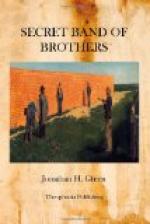The news of the colonel’s death soon spread through the city, and many gathered to witness the burial, but owing to the inclemency of the weather, few followed to the grave. When the hearse bore the body away, it rained very hard. I did not make my appearance on the occasion, for I well knew that many would be present to relieve their anxious minds—to rejoice rather than mourn over the dead, and who would sooner see my dead body deposited by that of the colonel’s, than any other on earth. I was determined not to be mourned for in that way, by the desperate villains. I therefore kept aloof from their society.
Several days elapsed, during which time I remained in concealment from all the clan, but Cunningham, who expressed a concern for my welfare. I also had frequent conferences with my friend, the deputy-marshal. Three days after the colonel’s death, Cunningham informed me, that he was convinced that both of the Browns deserved death.
“But I dare not tell you why,” said he, “and if I should, you would not be able to comprehend my reasons. Be assured, if they are guilty, the other brother will never come from that prison alive. He will find out, that the brotherhood are wide awake.”
All his insinuations were perfect Greek to me, for some weeks after; but when Taylor had his trial, the whole matter was explained. Their import I will now unfold.
CHAPTER IX.
From the time the plan was concocted, for making Taylor suffer the penalty of another’s crime, the utmost promptitude was required for its execution—the machinery must be actively employed by the friends of the colonel, and his brother. First, the colonel must be made sick, and a sympathy thereby awakened, and hence the plea for his removal would be the more plausible. His enlargement was important. He was a principal man, with whom it would be necessary to have much consultation—an intercourse more vital to the cause of his pretended than his real friends. Besides, there were many who really desired his escape, but being among the first class of society, as to wealth, respectability, and influence, they were unwilling to frequent the prison to visit the unfortunate colonel. Though interested deeply in his release, they were not willing the public should understand that they were sworn friends. The part the younger brother was to sustain, has already been detailed in a former chapter. The medicine was administered with the desired effect, and the colonel was removed to the hospital. He was now in a situation to be consulted. Many would now visit him, who never would have gone to the prison. If a reason was required for their familiarity with so base a man, it could be found in the dictates of kindness, called forth by suffering humanity. After his removal, his brother was under obligation to do as he had promised, to produce the spurious plates, the counterfeit money, and the correspondence, and swear them upon Taylor, as the real agent and proprietor. As the signatures of the letters were anonymous, other testimony was required to establish the real author.




